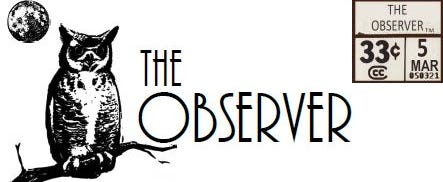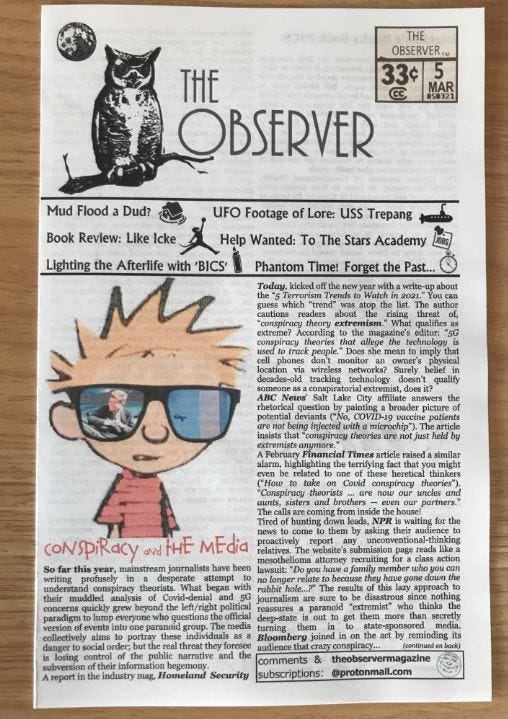Conspiracy & the Media
So far this year, mainstream journalists have been writing profusely in a desperate attempt to understand conspiracy theorists. What began with their muddled analysis of Covid-denial and 5G concerns quickly grew beyond the left/right political paradigm to lump everyone who questions the official version of events into one paranoid group. The media collectively aims to portray these individuals as a danger to social order; but the real threat they foresee is losing control of the public narrative and the subversion of their information hegemony.
A report in the industry mag, Homeland Security Today, kicked off the new year with a write-up about the “5 Terrorism Trends to Watch in 2021.” You can guess which “trend” was atop the list. The author cautions readers about the rising threat of, “conspiracy theory extremism.” What qualifies as extreme? According to the magazine’s editor: “5G conspiracy theories that allege the technology is used to track people.” Does she mean to imply that cell phones don’t monitor an owner’s physical location via wireless networks? Surely belief in decades-old tracking technology doesn’t qualify someone as a conspiratorial extremist, does it?
ABC News’ Salt Lake City affiliate answers the rhetorical question (“No, COVID-19 vaccine patients are not being injected with a microchip”) by painting a broader picture of potential deviants. The article insists that “conspiracy theories are not just held by extremists anymore.”
A February Financial Times article raised a similar alarm (“How to take on Covid conspiracy theories”), highlighting the terrifying fact that you might even be related to one of these heretical thinkers. “Conspiracy theorists … are now our uncles and aunts, sisters and brothers — even our partners.” The calls are coming from inside the house!
Tired of hunting down leads, NPR is waiting for the news to come to them by asking their audience to proactively report any unconventional-thinking relatives. The website’s submission page reads like a mesothelioma attorney recruiting for a class action lawsuit: “Do you have a family member who you can no longer relate to because they have gone down the rabbit hole…?” The results of this lazy approach to journalism are sure to be disastrous since nothing reassures a paranoid “extremist” who thinks the deep-state is out to get them more than secretly turning them in to state-sponsored media.
Bloomberg joined in on the act by reminding its audience that crazy conspiracy theorists exist across the globe — only sometimes their farfetched suspicions have a historical precedent. In an article about vaccine skepticism spreading across India and Pakistan (“Bin Laden Hunt and Robot Conspiracy Theories Test Pakistan Vaccine Drive”), the writers disclose a valid reason for the hesitancy from resident Muslims: Many of them have vivid memories of a CIA-organized vaccination drive that was used as a front to obtain DNA from members of Osama bin Laden’s family. This understandably left locals with, “a very bad taste,” and wary of a second helping.
The British outlet LBC printed an interview with a fact-checking group about ways to approach conversations with a conspiratorial “loved one.” One mind-bending piece of advice was to encourage the conspiracy theorists in one’s life to implicitly rely on “official” sources as a means of trustworthy information: “If it hasn’t been reported in the mainstream media, then it's probably something that hasn’t happened because you would have heard about it.” Where? In the mainstream media? This is quite literally the definition of circular reasoning and unlikely to convince anyone to change their perspective.
Instead of talking it out as their name implies, The Conversation recommended an alternative solution to combat unapproved narratives — more federal oversight (“Conspiracy theories: why are they thriving in the pandemic?”). The article suggested that “a senior figure in government might also be appointed to lead on addressing misinformation.” The Ministry of Truth comes to life.
Medscape, a medical news source, took a different tone than their journalistic peers when analyzing conspiracy theory adherents — asserting that a conspiratorial worldview doesn’t qualify someone as crazy (“Believing in Conspiracy Theories is not Delusional”). The two PhD authors maintain that belief in conspiracy theories is common, noting that “half the population believes in at least one.” Instead of adding to the laundry list of antisocial personality traits that other writers assigned to the conspiracy-crowd (“lunatic”; “extremist”; “dangerous”; “lack of analytical thinking”; “desire to be superior to others”), the Medscape authors found that people skeptical of the establishment don’t fit a neat description: “there is no reliable ‘profile’ for (conspiracy) believers.” In fact, the article was one of the few to acknowledge the most obvious reason for belief in conspiracy theories — the inconvenient fact that they “occasionally prove to be true.”
The good doctors from Medscape aside, what most in the media fail to realize is how often “conspiracy theorists” come to a debate armed with a bevy of facts from a wide array of disciplines. Outlets like the New York Times may boldly announce that “conspiracy theorists are by definition irrational, contradictory and inconsistent;” but this characterization is disproven based on actual experience. “Fringe” researchers tend to delve deeply into the material, amassing knowledge from conventional and unorthodox sources to inform their opinions. Arguments are dissected down to the most tedious, mundane detail and scrutinized thoroughly — they have to be in order to withstand the onslaught of criticism that their conspiratorial convictions attract. One only needs to browse the material produced by the Architects & Engineers for 9/11 Truth to find painstaking examples of this expert, technical analysis. Unsurprisingly, the media’s recent portrayal of conspiracists omits these defining attributes, instead claiming they harbor “contempt for expertise.” Hardly – the contempt is shown by the information-guardians in the media towards those who don’t readily accept their version of events.
In the end, many of the articles recently published about the rise of conspiratorial-thinkers conclude that it’s best to ignore them and not engage in debate. The Financial Times went so far as to declare the exchange of ideas worthless if you can’t change someone’s misguided mind (or as they so gingerly put it: “disabuse them of wrong-headed notions”); calling it, “a waste of one’s time and energy.” It’s telling that the same article cautioned against, “sharing a conspiracy theory in order to debunk it,” — citing fears that exposing the masses to “bad ideas” might accidentally convert more believers. Imagine, these arbiters of the public discourse afraid of an opposing theory simply because people might find it agreeable!
A separate opinion piece in the NY Times (“Don’t Go Down the Rabbit Hole”) urges readers to “Resist the lure of rabbit holes,” calling it “counterproductive to engage directly with content from an unknown source.” The author then laughingly offers up an expert method of trusting Wikipedia as a source of truth and “fact checking” by using Google.
While the media continues to define conspiracy theorists as a danger to civilization, the only real threat they see is a population armed with an alternative point of view. This concern among the purveyors of mass information in the media is shared by many professional academics. Ryan Neville-Shephard, a University of Arkansas professor who teaches a course on the topic of conspiracy theory, complained about what he sees as the contributing problem:
“What we don’t have anymore [are] gatekeepers, and we have immediate access to all the information that we want,” he said. “We can pick and choose what we want to hear.”
This lack of oversight is likewise worrisome to the scientific journal, Nature (“Tracking QAnon”). The author bemoans the fact that “the gatekeeping power of mass media has now shifted.” A layperson obtaining knowledge without an academic or media filter? Sounds dangerous.
What these fresh journalistic attempts to discredit the mind of a conspiracy theorist truly reveal are organizations terrified of a freethinking and open minded citizenry — a society that analyzes evidence and draws conclusions without the supervision of the intellectual mainstream.
If these sound like the mad-ravings of a conspiracy theorist — you’d be right.







